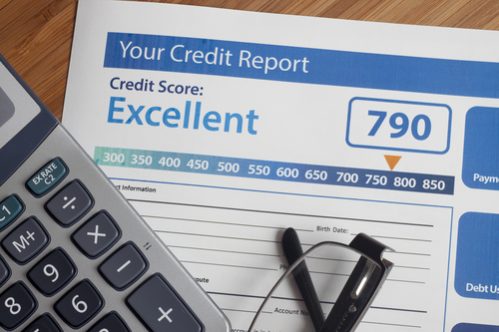Getting your first credit card is a milestone. For most it happens in high school or college, and comes with the feeling of truly stepping into the real world. There’s nothing quite like opening a line of credit to make you feel like a trusted, adult member of society.
 That feeling is deserved, but not for the reason you might think. Starting a credit history is a crucial part of developing a healthy financial lifestyle, and it’s not just about how much you can charge to that shiny new Visa. Your score can affect your life in a number of ways, many of which remain unnoticed or forgotten by the majority of credit card users.
That feeling is deserved, but not for the reason you might think. Starting a credit history is a crucial part of developing a healthy financial lifestyle, and it’s not just about how much you can charge to that shiny new Visa. Your score can affect your life in a number of ways, many of which remain unnoticed or forgotten by the majority of credit card users.
You can find your credit report at Credit Sesame. Check your report often to make sure it’s going up and that there is not odd activity.
Don’t be caught off guard by the effects of your credit history. Here are some of the more common ways your score can affect your everyday life:
Table of Contents
Employers
Some employers check your score and report, especially if you’ll be responsible for managing company finances – or a client’s. Start by managing your finances with Personal Capital and getting your credit report at least annually. If they see you’ve been irresponsible with your money, what’s to stop you from being irresponsible with theirs? These checks along with checking social media profiles are becoming a more common part of the application process. So, it might be time to consider your credit score as just another element of your resume and don’t forget to clean up your social profiles and make them private.
Apartments
Landlords frequently use a scores to gauge if you’ll be a good tenant. Evictions, not paying for damages and other rental issues can show on your credit report. If your score is too low, a landlord may deny your application or require that you have a cosigner on your lease.
Cell phone companies
Many cell phone providers run a credit check when processing your application. If your report shows late payments or defaults, they may ask you to put down a deposit before giving you a new phone. The more deposits you put down, the less cash you’ll have on hand.
Internet providers and utilities
If you don’t have a good credit score – or any history – utility providers and internet service companies might require you to put up a deposit as a show of good faith. This is especially common in college towns, where clients tend to have less of a financial history. It can even impact your car insurance rates. If you have a low credit score it can be an indicator that you are irresponsible with your money. Thus, they deduce you will be be a higher risk driver and increase your insurance rates. Check out eSurance for some of the best rates with great coverage.
Veterinarians
A trip to the vet can be a routine exam or a scary diagnosis. If it’s the latter, surgery or a complex treatment can cost thousands of dollars. If you don’t have the cash, a good score can mean the difference between getting access to the best plan or not having the funds to pay for your poodle’s emergency operation.
A good interest rate

Whether you’re looking for a car loan or a mortgage, a better credit score will almost always lead to a better interest rate – potentially saving you thousands of dollars or more. Experts recommend having a score of 740 or more to get the best rates.
Your love life
A recent study showed that people with high scores were more likely to have successful marriages. A good score can save you money on your bills, but also secure a more lasting partnership. The researcher’s conclusion? “Scores reveal an individual’s relationship skill and level of commitment and trustworthiness.” If you’re still in the dating game, consider upping your credit score to increase your chances of finding love.
It takes at least a few months to increase your score, so don’t get discouraged easily.
 Your credit score affects everything from your ability to rent an apartment to how much you can receive for a car loan. Most people are looking for ways to boost this score however possible, but it can be confusing.
Your credit score affects everything from your ability to rent an apartment to how much you can receive for a car loan. Most people are looking for ways to boost this score however possible, but it can be confusing.
If you’re trying to find how to get a 720 credit score in 6 months, keep reading!
How Your Credit Score Is Calculated
Your credit score is accumulated on a variety of information that indicates how well you pay back a debt. This includes data like late payments and bills sent to collection.
It also helps determine the amount that should be loaned to you, or that you can feasibly pay back. This includes looking at monthly payments and the total debt you currently hold, or your debt to income ratio.
Based on these factors, you’re given a number between 300 and 850. While it’s updated frequently, most people are frustrated by how slow it seems to improve. However, there are steps you can take to help that number increase quicker.
How to Get a 720 Credit Score in 6 Months
Here are ways you can effectively increase your credit score.
1. Increase the Amount of Open Credit You Hold on Revolving Lines
The amount of open credit you have on any given line is known as open credit, or the amount available for you to use. The higher this number is, the better.
For instance, if you have a credit card with a $5,000 limit and have a balance of $1,000, you’re using 20% of the credit available to you, meaning you have 80% of that limit left. Cards that have larger amounts open mean that you aren’t operating at the top of your means.
2. Dispute Any Errors You Find on Your Credit Report
You are entitled to access your credit report for free several times a year, and there are companies that offer monitoring services.
If you find any errors on your credit report, you should use a service like DisputeBee to immediately fix them. Small errors can have damaging results that keep your credit score stationary if they aren’t corrected.
 3. Ask for a Higher Credit Card Limit
3. Ask for a Higher Credit Card Limit
Request a higher limit on your cards from your credit card company. This will help increase the amount of open credit you have available automatically, without you having to pay down debt.
4. Use Both Credit Cards and Loans
Don’t just rely on credit cards. Different kinds of credit, from bank loans to rental contracts, can help show how responsible you are and boost your score.
5. Pay Every Bill on Time
This should go without saying, but one of the easiest ways to boost your credit is to pay every bill you have on time. This isn’t just credit cards – any late payment can be reported to the credit bureaus.
Repairing Your Credit Score

Sometimes it’s an extenuating financial crisis, and sometimes it’s just the result of being a little careless with money, but a credit score is an easy thing to damage.
Taking on Debt
But if you’re wondering how to get a 720 credit score in 6 months, know that you can bring your credit score back up fast if you’re willing to put in some serious financial work and monitor the situation.
 There are various reasons you might borrow money or open a line of credit. Debt can be a healthy way to fulfill your financial or lifestyle goals, and it helps you to build a good credit record. Debt can also be a bad thing, though, especially when you end up with high-interest debts or negative equity. While there are times when it makes sense to take on a debt or open a new line of credit or credit card, there are also times when it’s a bad idea. So what should you ask yourself to make sure you’re making the right decision?
There are various reasons you might borrow money or open a line of credit. Debt can be a healthy way to fulfill your financial or lifestyle goals, and it helps you to build a good credit record. Debt can also be a bad thing, though, especially when you end up with high-interest debts or negative equity. While there are times when it makes sense to take on a debt or open a new line of credit or credit card, there are also times when it’s a bad idea. So what should you ask yourself to make sure you’re making the right decision?
Is Cash Preferable and Possible?
Before borrowing money, you should consider whether paying with cash is a better idea and if it’s possible. If you could take a few months to save the money that you need, it will ultimately mean you could save money. Of course, there are times when you might be unable to use cash. Buying a house is not usually a transaction entirely carried out in cash, although you do need a certain amount for a down payment. However, there are times when paying in cash is the choice that will help you long-term.
What Can You Afford?
It’s important to know what you can afford to pay. Debt should help you to spread out the cost of something, but it’s only a good idea if you can afford to make the scheduled payments. You need to calculate how much you are able to repay before you decide if a new debt is a good choice. Take a look at your income and your current outgoings to see how much you can afford to spend each month. There should be some room in your budget, so you’re not just breaking even at the end of each month.
Will It Benefit You?

When you take on a new debt or credit, you need to consider whether it will ultimately benefit you. Even if you can afford to pay it off, what will it do for you? Maybe in the short-term, it might pay for you to make home improvements. In the long-term, a new debt could mean you own your own home or maybe improve your credit score so that you can be a homeowner in the future. Using a credit card and paying it off every month and boost your good credit.
What Happens If You Can’t Pay Your Debt?
Finally, you need to think about what might happen if you can’t pay your debt. You might want to look at the theory of money is debt explained to read about how debt works. If you struggle to pay your debts, will you be able to discharge them if necessary? What methods will you be able to use to pay what you owe or get rid of your debts, even if you are not very financially stable?
Ask yourself these questions before you take on a debt or line of credit, and you can make sure you’re doing it for the right reasons.
 3. Ask for a Higher Credit Card Limit
3. Ask for a Higher Credit Card Limit